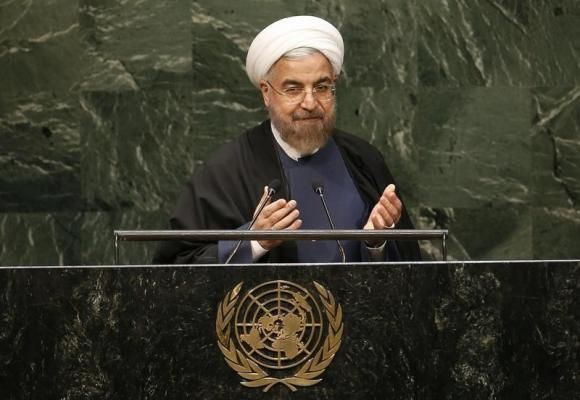 ranian President Hassan Rouhani gestures at the conclusion of his address to the 69th United Nations General Assembly at the United Nations Headquarters in New York, September 25, 2014.Major world powers have begun talks about a United Nations Security Council resolution to lift U.N. sanctions on Iran if a nuclear agreement is struck with Tehran, a step that could make it harder for the U.S. Congress to undo a deal, Western officials said.
ranian President Hassan Rouhani gestures at the conclusion of his address to the 69th United Nations General Assembly at the United Nations Headquarters in New York, September 25, 2014.Major world powers have begun talks about a United Nations Security Council resolution to lift U.N. sanctions on Iran if a nuclear agreement is struck with Tehran, a step that could make it harder for the U.S. Congress to undo a deal, Western officials said.
The talks between Britain, China, France, Russia and the United States — the five permanent members of the Security Council — plus Germany and Iran, are taking place ahead of difficult negotiations that resume next week over constricting Iran's nuclear ability.
Some eight U.N. resolutions - four of them imposing sanctions - ban Iran from uranium enrichment and other sensitive atomic work and bar it from buying and selling atomic technology and anything linked to ballistic missiles. There is also a U.N. arms embargo.
Iran sees their removal as crucial as U.N. measures are a legal basis for more stringent U.S. and European Union measures to be enforced. The U.S. and EU often cite violations of the U.N. ban on enrichment and other sensitive nuclear work as justification for imposing additional penalties on Iran.
U.S. Secretary of State John Kerry told Congress on Wednesday that an Iran nuclear deal would not be legally binding, meaning future U.S. presidents could decide not to implement it. That point was emphasized in an open letter by 47 Republican senators sent on Monday to Iran's leaders asserting any deal could be discarded once President Barack Obama leaves office in January 2017.
But a Security Council resolution on a nuclear deal with Iran could be legally binding, say Western diplomatic officials. That could complicate and possibly undercut future attempts by Republicans in Washington to unravel an agreement.
Iran and the six powers are aiming to complete the framework of a nuclear deal by the end of March, and achieve a full agreement by June 30, to curb Iran's most sensitive nuclear activities for at least 10 years in exchange for a gradual end to all sanctions on the Islamic Republic.
So far, those talks have focused on separate U.S. and European Union sanctions on Iran's energy and financial sectors, which Tehran desperately wants removed. The sanctions question is a sticking point in the talks that resume next week in Lausanne, Switzerland, between Iran and the six powers.
But Western officials involved in the negotiations said they are also discussing elements to include in a draft resolution for the 15-nation Security Council to begin easing U.N. nuclear-related sanctions that have been in place since December 2006.
"If there's a nuclear deal, and that's still a big 'if', we'll want to move quickly on the U.N. sanctions issue," an official said, requesting anonymity.
The negotiations are taking place at senior foreign ministry level at the six powers and Iran, and not at the United Nations in New York.
Source: reuters
 В Атырау -10
В Атырау -10